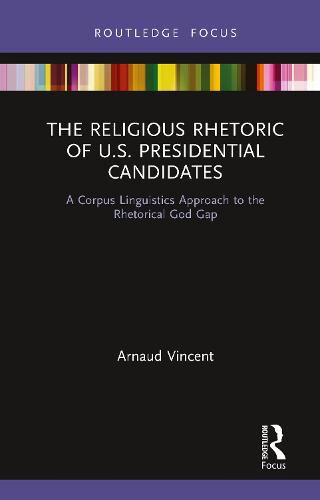Readings Newsletter
Become a Readings Member to make your shopping experience even easier.
Sign in or sign up for free!
You’re not far away from qualifying for FREE standard shipping within Australia
You’ve qualified for FREE standard shipping within Australia
The cart is loading…






Drawing on corpus linguistic methods of analysis, this book critically examines the rhetorical God gap in American political discourse between the Democratic and Republican parties. The volume investigates the claims (which have often not been substantiated by quantitative data in the literature and have tended to focus on particular genres of political discourse) that there is a correlation between a higher degree of religiosity in Republican political discourse and voting preferences for the party and that Democratic politicians should engage in similar discourse toward closing the gap. The book adopts a keyword approach, using such techniques as collocation analyses, concordance reading, and Bible-specific N-gram identification, toward the study of a corpus of general campaign speeches over a 50-year period, and links findings from this data with social and cultural contextual factors to provide a more informed understanding of rhetorical patterns in religiously laden political language. The volume showcases the value of corpus linguistic methods in interrogating claims around political language and their broader applicability in linguistic research, making this key reading for students and scholars in corpus linguistics, critical discourse analysis, American politics, and religious studies.
$9.00 standard shipping within Australia
FREE standard shipping within Australia for orders over $100.00
Express & International shipping calculated at checkout
Drawing on corpus linguistic methods of analysis, this book critically examines the rhetorical God gap in American political discourse between the Democratic and Republican parties. The volume investigates the claims (which have often not been substantiated by quantitative data in the literature and have tended to focus on particular genres of political discourse) that there is a correlation between a higher degree of religiosity in Republican political discourse and voting preferences for the party and that Democratic politicians should engage in similar discourse toward closing the gap. The book adopts a keyword approach, using such techniques as collocation analyses, concordance reading, and Bible-specific N-gram identification, toward the study of a corpus of general campaign speeches over a 50-year period, and links findings from this data with social and cultural contextual factors to provide a more informed understanding of rhetorical patterns in religiously laden political language. The volume showcases the value of corpus linguistic methods in interrogating claims around political language and their broader applicability in linguistic research, making this key reading for students and scholars in corpus linguistics, critical discourse analysis, American politics, and religious studies.